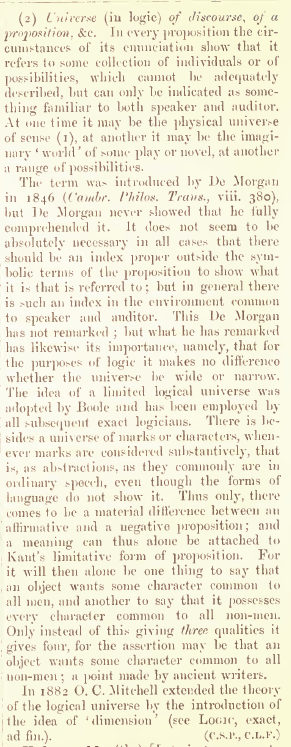Manuscript Image

In every proposition the circumstances of its enunciation show that it refers to some collection of individuals or of possibilities, which cannot be adequately described, but can only be indicated as something familiar to both speaker and auditor. At one time it may be the physical universe of sense (1), at another it may be the imaginary “world” of some play or novel, at another a range of possibilities.
The term was introduced by De Morgan in 1846 (Cambridge Philosophical Transactions, viii, 380) but De Morgan never showed that he fully comprehended it. It does not seem to be absolutely necessary in all cases that there should be an index proper outside the symbolic terms of the proposition to show what it is that is referred to; but in general there is such an index in the environment common to speaker and auditor. This De Morgan has not remarked; but what he has remarked has likewise its importance, namely, that for the purposes of logic it makes no difference whether the universe be wide or narrow. The idea of a limited logical universe was adopted by Boole and has been employed by all subsequent exact logicians. There is besides a universe of marks or characters, whenever marks are considered substantively, that is, as abstractions, as they commonly are in ordinary speech, even though the forms of language do not show it. Thus only, there comes to be a material difference between an affirmative and a negative proposition. For it will then alone be one thing to say that an object wants some character common to all men and another to say that it possesses every character common to all non-men. Only instead of giving three qualities it gives four, for the assertion may be that an object wants some character common to all non-men; a point made by ancient writers.
In 1882 O. C. Mitchell extended the theory of the logical universe by the introduction of the idea of ‘dimension’.
